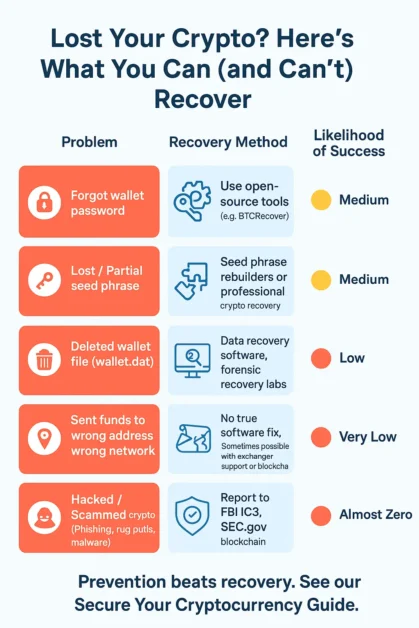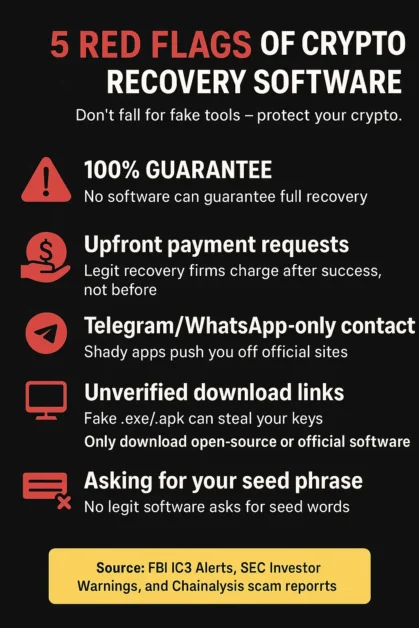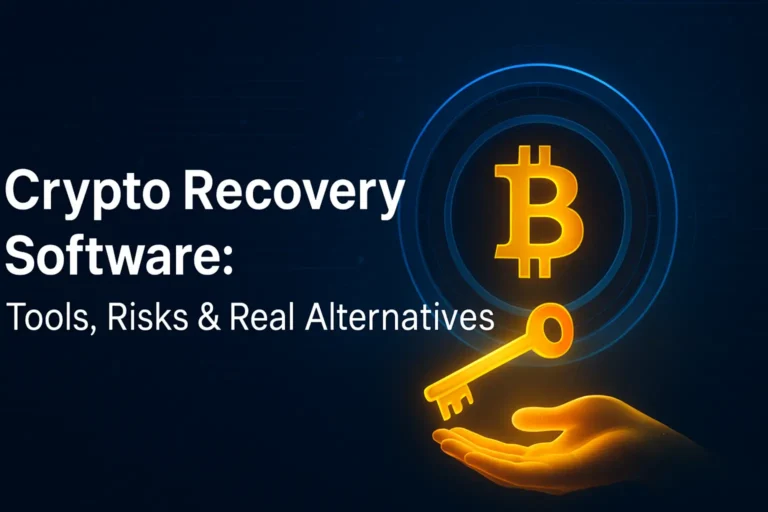If you’ve ever lost access to your crypto wallet, you know the sinking feeling. I’ve spoken to countless people — from beginners with a few hundred dollars in Ethereum to traders holding entire Bitcoin stacks — who suddenly realized their recovery phrase or password was gone. It’s one of the most stressful moments in crypto.
That’s where crypto recovery software comes in. These tools promise to “unlock” lost wallets or fix corrupted files. Some are legitimate (like open-source BTCRecover), while many others are nothing more than scams — something the FBI and SEC have repeatedly warned about.
Quick take: In my opinion, recovery software is useful in very specific cases — but dangerous if you don’t know what you’re downloading. This guide breaks down what works, what doesn’t, and how to avoid the fake tools designed to steal your crypto.
If you’re already exploring recovery options because you were scammed, I recommend starting with this read: Are All Crypto Recovery Services Scams?.
In this guide, we’ll break down what works, what doesn’t, and how to protect yourself from the scams that regulators like the FBI and SEC have been warning about for years.
What Is Crypto Recovery Software?
Crypto recovery software is designed to help users regain access to lost wallets, seed phrases, or passwords. In my experience, the legitimate ones (like BTCRecover) are niche tools for tech-savvy users — but many shady “apps” online are just malware disguised as helpers. Always check whether a tool is open-source and community-vetted before even downloading it.
Quick answer: It’s basically a “digital locksmith” for your crypto.
Common cases where people turn to these tools:
- Forgotten exchange or wallet passwords
- Corrupted or missing wallet.dat files
- Partial or mistyped recovery phrases
- Old devices with inaccessible wallets
If your crypto ended up on the wrong network, don’t panic — follow our step-by-step recovery guide here.
How Does Crypto Recovery Software Work?

Quick answer: Recovery software doesn’t “unlock” the blockchain — it just tries to rebuild or brute-force your credentials.
Most of these tools rely on brute-force password attempts, phrase correction, or blockchain data parsing. That sounds powerful, but in reality, success depends heavily on how much information you still remember. From what I’ve seen, the software is only useful if you already have partial data — not if your wallet is completely gone.
Password Recovery Tools
- BTCRecover (open source) attempts variations of forgotten passwords.
- Uses dictionaries, brute-force, or personal data combinations.
- Downsides: strong, random passwords can take years to crack.
Seed Phrase Recovery
- Software fills in missing words in a BIP39 phrase.
- Good if you remember most of your 12–24 words but not all.
Device Forensics
- Specialized tools like Recovery Cat scan old hard drives, USBs, or phones for hidden wallet files.
- Useful if your MetaMask, Electrum, or Bitcoin Core wallet got deleted.
Want to know if recovery services are scams? Read our full guide Are All Crypto Recovery Services Scams?
Legitimate Crypto Recovery Software (2025 List)
There are a handful of names that keep coming up — BTCRecover, Recovery Cat, and some commercial forensic services. While I’ve tested BTCRecover and found it reliable in narrow use cases, I’d be cautious about anything that asks for upfront payment or hides its source code. Transparency is the first green flag.
Quick answer: Only a handful of trustworthy tools exist, and even those have narrow use cases.
BTCRecover (Open Source, GitHub)
- Best for: Forgotten passwords, seed phrase variations.
- Why it’s trusted: Open-source, peer-reviewed, and frequently discussed on Reddit’s r/Bitcoin and r/CryptoCurrency.
- Success cases: Many users report recovering wallets after days/weeks of brute-forcing — especially when the password was only partially forgotten.
- Caution: If your password is completely random and long, recovery may be mathematically impossible.
💬 Example: One Redditor shared how they cracked an old Ethereum wallet after running BTCRecover with personal data variations for 9 days straight.
Recovery Cat (Cat Labs)
- Best for: Professional investigations and enterprise cases.
- Why it’s trusted: Cat Labs, founded by ex-Google security experts, specializes in forensic crypto recovery. Their toolset is used by law enforcement agencies and cybersecurity firms, not casual investors.
- Limitations: It’s not DIY-friendly — more a “lab-grade tool” than a consumer app.
Gillware Crypto Recovery Tools
- Best for: Users who need expert oversight.
- How it works: Gillware is a digital forensics company offering crypto recovery services. Their “software” is not a standalone download but part of their professional toolkit when handling client drives and wallets.
- Featured in FBI-referenced cases of data forensics and often cited in cybersecurity conferences.
In my opinion, Gillware is less about DIY software and more about paying for expert handling of your data.
Blockchain.com x Unciphered Recovery
- Best for: Users locked out of Blockchain.com wallets specifically.
- Why it’s trusted: Unciphered is a professional recovery company that has partnered directly with Blockchain.com to handle tough cases.
- Success cases: Reported in CoinDesk as part of a broader push for custodial wallet recovery support.
- Limitations: Doesn’t apply to other wallets or blockchains.
✅ Key takeaway:
- If you’re a DIY type, BTCRecover is your only real bet.
- If you’re dealing with large sums or legal evidence, forensic services like Gillware or Recovery Cat are the smarter move.
- Anything else — especially random Telegram “tools” — is almost certainly a scam.
Next, read our guide on cryptocurrency recovery firms with no upfront fees to see how professional services compare.
Anything else — especially software shared via Telegram or Twitter DMs — is highly likely malware. Chainalysis has reported that recovery scams are among the fastest-growing crypto fraud types (Chainalysis 2023 Crime Report).
Crypto Recovery Software Comparison (2025)
| Tool / Service | Type | Best For | Trust Factors | Limitations | Cost Model |
|---|---|---|---|---|---|
| BTCRecover (GitHub) | Open-source DIY | Forgotten wallet passwords & seed phrase variations | Community-supported, widely discussed on Reddit, transparent code | Requires technical skills; brute force only works if you remember part of the password | Free |
| Recovery Cat (Cat Labs) | Enterprise-grade | Law enforcement, forensic labs, enterprise recovery | Built by ex-Google security pros, used in official investigations | Not consumer-friendly, no DIY option | Case-by-case / premium |
| Gillware Crypto Recovery | Professional service | Users needing expert oversight with corrupted wallets/drives | Established digital forensics firm, cited in FBI cases | Not standalone software, requires handing over data | Paid service (consultation + recovery fees) |
| Blockchain.com x Unciphered | Partnered service | Locked Blockchain.com wallets | Official collaboration, covered by CoinDesk | Only works for Blockchain.com wallets, no general use | Paid, varies by case |
How to decide?
- If you’re tech-savvy and the amount is small → try BTCRecover first.
- If you’re recovering large sums or legal evidence → go with Gillware or Recovery Cat.
- If you’re locked out of a Blockchain.com wallet → only Unciphered will work.
Related read: Legitimate crypto recovery companies
Risks & Red Flags of Crypto Recovery Software

The biggest pro: you might get your funds back without involving a third party.
The biggest con: you could install malware or waste weeks with no results. In my opinion, it’s a “last-mile” option — only worth trying if you’ve ruled out safer alternatives.
If a tool promises “guaranteed recovery” or asks you to transfer crypto before using it, that’s almost always a scam. The FBI and SEC have documented countless cases where victims lost even more money this way. Honestly, if it feels too easy, it’s probably a trap.
Quick answer: Most free tools online are just scams designed to steal your private keys.
Why Most Are Fake
- Malware that copies your wallet.dat file.
- Ransomware disguised as “recovery.”
- Phishing sites pushing fake downloads.
Limitations
- Software can’t recover stolen funds.
- It can’t reverse blockchain confirmations.
- It won’t bypass an exchange’s KYC.
Scam Patterns to Watch For
- “100% guarantee” promises (impossible).
- WhatsApp/Telegram contact links.
- Upfront payments without results.
Related read: Honeypot Crypto: Spot & Avoid Scams.
Crypto Recovery Software vs Professional Services
Quick answer: DIY tools are good for small personal recoveries; professional services are better for complex or legal cases.
Software can help if you’re somewhat technical and already have partial wallet details, but it’s limited. Professional services, on the other hand, bring forensic tools, legal backing, and experience — though they come with higher costs and trust risks. In my opinion, the best choice depends on whether you value control or expert oversight.
When DIY Works
- Forgot password
- Partial seed phrase
- Lost wallet.dat
When You Need a Service
- Large funds at risk
- Legal evidence required
- Funds stolen in a hack
Best Practices If You Try Recovery Software
If you’re going to test recovery software, do it safely: only use open-source tools, run them on an isolated device, and never share your seed phrase online. I’ve seen too many Reddit posts where people rushed in and got scammed. Think of it like handling chemicals — useful, but only if you respect the risks.
Quick answer: Treat recovery software like a loaded gun — handle with extreme caution.
- Always run tools offline on a secure computer.
- Backup wallets before testing.
- Only download from official GitHub repos.
- Never share your seed phrase online.
Related: Secure Your Cryptocurrency – Complete Guide.
Alternatives & Prevention
From FBI reports on ransomware wallet seizures to everyday Reddit users cracking lost Metamask passwords, the stories vary wildly. What stands out is that small wins happen — but massive losses are rarely reversed. Learning from these case studies gives us a clearer picture of what’s realistic versus what’s hype.
Sometimes the smarter move isn’t recovery at all, but prevention. Hardware wallets, multisig setups, and detailed backups (both digital and physical) can eliminate 90% of recovery headaches. I’d argue this is where most crypto holders should focus, instead of pinning hopes on miracle fixes.
Quick answer: Prevention beats recovery every single time.
- Exchange support: Coinbase, Binance often help with account lockouts.
- Hardware wallets: Ledger/Trezor offer safe recovery methods.
- Security hygiene:
- Store seeds in multiple offline locations.
- Use multisig for large holdings.
- Never store recovery phrases in your email.
To stay ahead: read How to Avoid Losing in Crypto Trading.
Real-World Stories & Case Studies
- Success: A Redditor recovered Ethereum using BTCRecover after two weeks of brute-forcing.
- Failure: A Quora user lost 10 BTC after installing “recovery software” from a fake Twitter account.
- Regulator Alerts: The FBI Internet Crime Complaint Center has repeatedly warned of fake recovery apps targeting victims of scams.
Honestly, the failures and scams far outweigh the rare successes.
FAQs On Crypto Recovery Software
Q: Can Coinbase recover my lost crypto?
A: Only if you lost access to your Coinbase account — not blockchain wallets.
Q: Is BTCRecover safe?
A: Yes, but only if downloaded directly from its official GitHub repo and run offline.
Q: Do regulators recognize crypto recovery scams?
Q: Can recovery companies trace stolen funds?
A: Some professional firms work with blockchain analytics tools like Chainalysis, but recovery is never guaranteed.
Conclusion – Is Crypto Recovery Software Worth It?
For most people, the answer is: only in very specific situations. If you’re missing one word in a seed phrase, or half-forgot a password, it can help. But if you’ve lost everything, I’d say your energy is better spent on prevention and legitimate recovery services than chasing software promises.
Yes, there are a few legitimate tools. But software alone won’t solve major hacks or scams — and the space is flooded with malicious apps. Prevention and safe custody practices are your real defense.
🔗 Next read: Are All Crypto Recovery Services Scams?
Adrian Smith is a Web3 strategist and lead writer at CryptoBrandHub.com, with 8+ years of experience in crypto marketing, NFT monetization, and DeFi tools. He helps creators and investors navigate the fast-changing world of blockchain with practical, research-backed insights.

